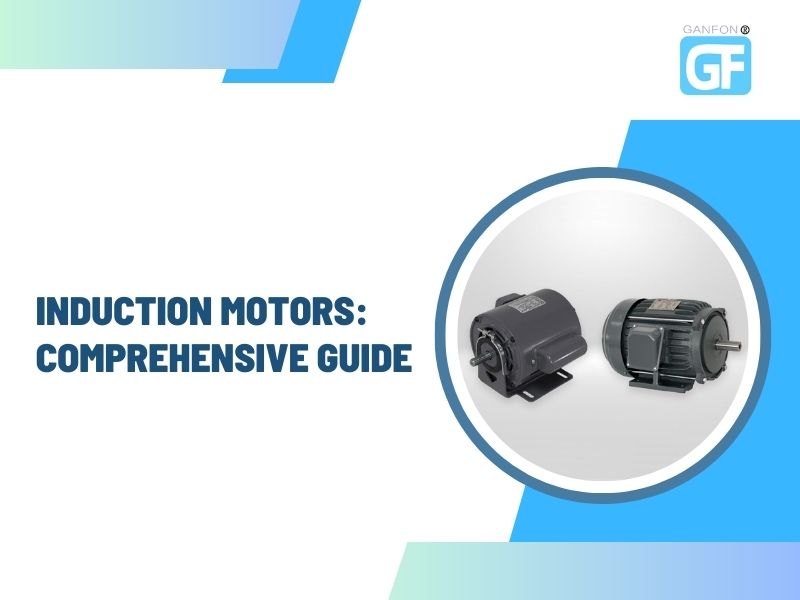2025.01.15
Blog
Induction Motors: Comprehensive Guide

Induction motors, a cornerstone of modern industry, play a critical role in powering countless applications. As a leading motor manufacturer, GANFON is committed to providing high-quality solutions tailored to diverse industry needs. This article dives into what makes induction motors indispensable and highlights their features, benefits, applications, and types, along with GANFON's dedication to delivering superior products and services.
What is an Induction Motor?
An induction motor is an AC motor in which the rotor current is generated by the rotating magnetic field of the stator through electromagnetic induction, eliminating the need for a direct electrical connection to an external power source. This design results in a simple structure and reliable operation, making induction motors widely used in industrial equipment, household appliances, transportation systems, agricultural machinery, and renewable energy systems. They are highly adaptable to different environments, can operate continuously for long periods, and require minimal maintenance.
Key Components of an Induction Motor
- Stator: The stationary part of the motor that generates a rotating magnetic field when current flows through its windings.
- Windings: Copper wires within the stator, responsible for conducting electricity to generate the magnetic field.
- Rotor: A cylindrical component inside the stator. It induces current from the rotating magnetic field and generates rotational torque.
- Housing: Protects the internal components from external factors and provides structural support.
- Bearings: Facilitate smooth rotation of the rotor and reduce friction.
Types of Induction Motors
Induction motors are classified based on power source and rotor structure:
1. Classification by Power Supply
(1) Single-Phase Induction Motors
- Description: Operate on a single-phase AC supply and are primarily used for low-power applications.
- Applications: Household appliances such as fans, refrigerators, and washing machines.
- Advantages: Simple design, affordable, and easy to maintain.
- Common Subtypes:
- Split-Phase Motors: Used in applications requiring moderate starting torque.
- Capacitor-Start Motors: Suitable for high starting torque needs, such as pumps and air compressors.
- Shaded-Pole Motors: Compact and ideal for devices like table fans and exhaust systems.
(2) Three-Phase Induction Motors
- Description: Operate on three-phase AC supply and are widely used in industrial and commercial applications.
- Applications: Factories, workshops, conveyor systems, and elevators.
- Advantages: Higher efficiency, reliability, and power output.
2. Classification by Rotor Structure
Induction motors have two main rotor types, each suitable for different applications:
(1) Squirrel Cage Induction Motor
The rotor is composed of aluminum or copper bars cast into a short-circuited ring structure, resembling a "squirrel cage," which gives it its name. Unlike other motor types, it has no direct electrical connection to the stator, relying entirely on electromagnetic induction for rotation. With its simple design, free of slip rings or brushes, this structure minimizes maintenance requirements while ensuring reliable operation.
(2) Wound Rotor Induction Motor
The rotor is made up of wound coils that connect to an external resistor or controller through slip rings and brushes. This design allows for adjustable rotor resistance, providing greater control over starting current and torque characteristics.
Advantages of Induction Motors
- Durability: Can withstand harsh environments and challenging operating conditions.
- Low Maintenance: Lack of brushes and commutators reduces wear and tear.
- Cost-Effectiveness: Affordable initial cost and long service life.
- Versatility: Available in various power ratings and designs to suit different applications.
Applications of Induction Motors
Induction motors power a broad range of devices and systems, including:
- Industrial Machinery: Pumps, compressors, and conveyor belts.
- Domestic Appliances: Fans, washing machines, and refrigerators.
- Transportation Systems: Electric vehicles, trains, and escalators.
- Agriculture: Irrigation pumps, threshers, and milling machines.
- Renewable Energy: Wind turbines and other sustainable power systems.
Why Choose GANFON for Induction Motors?
GANFON stands out as a trusted name in the induction motor industry. Here's why:
- ISO9001 Certification: Certified since 2011, ensuring consistent quality.
- "Quality First" Philosophy: We rigorously implement quality management systems to ensure every product meets and exceeds customer expectations.
- Rich Technical Expertise: With decades of experience, we provide professional advice to help customers select the most suitable motor solutions.
- Customized Design and Development: Our flexible designs cater to standard and unique requirements, adding significant value to customer products.
- Small-Batch Production Capabilities: We offer adaptable production for smaller orders, reducing costs and accelerating market entry.
- Comprehensive Support: Our team ensures reliable after-sales service, making GANFON a dependable partner for businesses worldwide.
By choosing GANFON, you partner with a company that combines quality, innovation, and customer-centric service to deliver the best induction motor solutions.
Conclusion
Induction motors are vital to numerous industries, combining efficiency, reliability, and versatility. GANFON's induction motors are designed to meet diverse needs, whether for industrial automation, household appliances, or sustainable energy systems.
Partner with GANFON for unmatched quality and service. Learn more about our innovative solutions or contact us today to discuss your requirements!

